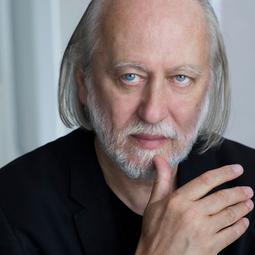 |
|
| László Krasznahorkai (photo: Nina Subin) |
|
The Swedish Academy has awarded the 2025 Nobel Prize for Literature to Hungarian author László Krasznahorkai for his "compelling and visionary oeuvre that, in the midst of apocalyptic terror, reaffirms the power of art." The Academy called him "a great epic writer in the Central European tradition that extends through Kafka to Thomas Bernhard, and is characterised by absurdism and grotesque excess. But there are more strings to his bow, and he also looks to the East in adopting a more contemplative, finely calibrated tone."
Born in 1954, Krasznahorkai published Satantango, his first novel, in 1985, "a literary sensation in Hungary and the author's breakthrough work," the Academy wrote in a bio-bibliography. "The novel portrays, in powerfully suggestive terms, a destitute group of residents on an abandoned collective farm in the Hungarian countryside just before the fall of communism." (This and other titles below have been published in the U.S. by New Directions.)
Among his other titles is The Melancholy of Resistance (1998), "a feverish horror fantasy played out in a small Hungarian town nestled in a Carpathian valley, [where] the drama has been heightened even further." There is "a dizzying state of emergency. Ominous signs abound."
In War & War (2006) Krasznahorkai "shifts his attention beyond the borders of his Hungarian homeland in allowing the humble archivist Korin to decide, as his life's final act, to travel from the outskirts of Budapest to New York such that he might, for a moment, take his place at the centre of the world. Back home in the archives, he has found an exceptionally beautiful ancient epic about returning warriors that he hopes to make known to the world. Krasznahorkai's prose has developed towards the flowing syntax with long, winding sentences devoid of full stops that has become his signature."
In Baron Wenckheim's Homecoming (2019), "Dostoyevsky's idiot is reincarnated in the hopelessly infatuated baron with his gambling addiction. Now ruined, he is on his way home to Hungary having spent many years living in exile in Argentina. He hopes to be reunited with his childhood sweetheart, whom he is unable to forget. Unhappily, in the course of his journey, he places his life in the hands of the treacherous Dante, a rascal presented as a grimy version of Sancho Panza. The climax of the novel, which is in many ways its comic highlight, is the joyful reception laid on for the baron by the local community, which the melancholic protagonist seeks at any cost to avoid."
Herscht 07769: A Novel (2024) offers "a credible portrayal of a contemporary small town in Thüringen, Germany, which is nevertheless also afflicted by social anarchy, murder and arson. At the same time, the terror of the novel plays out against the backdrop of Johann Sebastian Bach's powerful legacy... Herscht 07769 has been described as a great contemporary German novel, on account of its accuracy in portraying the country's social unrest."
Krasznahorkai won the 2019 National Book Award for Translated Literature for Baron Wenckheim's Homecoming and the 2015 Man Booker International Prize for lifetime achievement. He also won two succeeding Best Translated Book Awards, in 2013 and 2014, for Satantango and Seiobo There Below, a short story collection, respectively.

